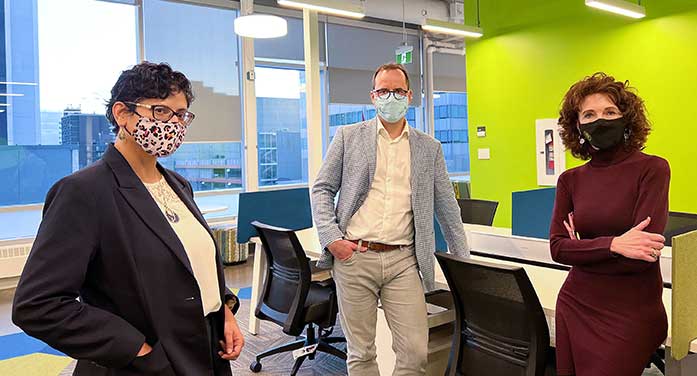The University of Alberta Health Hub and Accelerator has a new name, a new mission and values, and new services to offer innovators and entrepreneurs starting out in the health sector.
Located at Enterprise Square in downtown Edmonton, the accelerator is being rebranded the Health Innovation Hub, effective this month. The vision is for the hub to be the community incubator for innovators and entrepreneurs working toward better human health outcomes, said Paramita Chaudhuri Basu, innovation and entrepreneurship manager in the Faculty of Medicine & Dentistry.
“The U of A has always been a research-intensive, research-focused university – that is our strength. We have a large repertoire of R&D facilities, infrastructure and innovation assets. The Health Innovation Hub will leverage these amazing resources,” said Chaudhuri Basu.
“The hub will be the glue that connects the different resources available at the U of A and beyond for innovators in the human health sector.”
The mission, said Chaudhuri Basu, is to “help health entrepreneurs achieve commercialization success for their health and life science innovations by providing programming support, access to space and training resources, coaching and consulting support, and connections to peers and advisers.”
“We aim to build a community of health innovators. The Health Innovation Hub will not be restricted to entrepreneurs with a connection to the U of A. Health innovators from anywhere in Alberta are welcome to join,” she noted.
Chaudhuri Basu took over leadership of the organization last June and has been working hard at developing its new strategy. She has a PhD in biochemistry from Jadavpur University in India and an MBA from the U of A. She has deep subject matter expertise in health and life sciences and many years of experience in mentorship and coaching – a skill set she describes as “marrying science and business.”

(From left) Paramita Chaudhuri Basu, innovation and entrepreneurship manager in the Faculty of Medicine & Dentistry; Lawrence Richer, vice-dean of clinical research in the Faculty of Medicine & Dentistry; and Deborah James, associate vice-president of innovation and commercialization, at the Health Innovation Hub space in Enterprise Square (Photo: Jordan Carson)
There are 34 companies in the Health Hub, ranging from early-stage startups to larger firms that have already attracted millions of dollars in investment. Entos Pharmaceuticals, for example, was recently awarded $15.5 million from the Alberta government to set up a vaccine manufacturing facility in Edmonton.
All current hub companies will continue in the newly rebranded Health Innovation Hub. Chaudhuri Basu hopes to expand the hub to at least 50 member companies by the end of 2022. “We want to be inclusive of different aspects of health innovation,” she said. “These include mental health, social innovations in the health sphere, the health services industry and patient- or community-focused health endeavours.”
The rebranded organization will continue to offer its member companies access to its nearly 8,000 square feet of wet lab and collaboration space downtown. Lawrence Richer, vice-dean of clinical research in the Faculty of Medicine & Dentistry, describes the space as “absolutely gorgeous.”
“This is a jewel of an asset for small companies looking to decamp out of university space, but so few people know about it,” said Richer. He is excited that Chaudhuri Basu is taking the organization in a new direction and raising its profile. “I see great growth potential.”
In addition to continuing to provide coaching and networking help, the Health Innovation Hub will offer a wider range of services, including programming support for health entrepreneurs, marketing and communications outreach for the companies, business consulting and associated services. A bi-weekly newsletter, sharing news and job postings for the companies, has already been launched provincewide. Some of these new services will be offered to member companies on a fee-for-service basis.
Deborah James, U of A associate vice-president of innovation and commercialization, said the Health Innovation Hub is a critical component of the university’s innovation, entrepreneurship and commercialization strategy.
“We are positioning into a more entrepreneurial university,” said James, who was appointed to her current position two years ago as part of that push. “There’s always been a cohort of innovators and entrepreneurs at the university, but we’re trying to increase the culture of innovation and the volume of innovation that leaves our corridors and creates social and economic impact.
“I love the idea that the organization is getting a new brand and a new profile,” added James. “It’s intended to be the go-to place for health innovation on campus.”
Richer said it’s important that the Health Innovation Hub is becoming more integrated into the strategic objectives of both the Faculty of Medicine & Dentistry and the broader university.
The provincial government’s Alberta 2030 initiative calls on universities to contribute to the diversification of Alberta’s economy with an increased emphasis on innovation, commercialization and entrepreneurship. Health innovation is one of the U of A’s priority areas, and work done by the Health Innovation Hub will help foster a new culture at the university, one that supports moving discoveries out of the lab into commercializable products and companies.
“This is important,” said Richer. “The greatest discoveries, if they stay in the lab, have no value to anyone.”
| By Keri Sweetman
Submitted by the University of Alberta’s Folio online magazine. The University of Alberta is a Troy Media Editorial Content Provider Partner.
© Troy Media
Troy Media is an editorial content provider to media outlets and its own hosted community news outlets across Canada.


